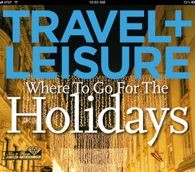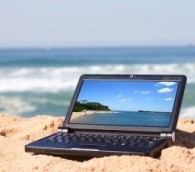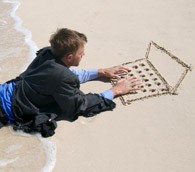Tag: Travel And Technology
R.I.P. The International Herald Tribune
by Jim Benning | 02.26.13 | 11:56 AM ET
The venerable newspaper isn’t going away, but it will be getting a name change. The New York Times Company, which owns it, announced Monday that it will change the name of the publication this fall to The International New York Times.
From the New York Times’ story, which quotes IHT publisher Stephen Dunbar-Johnson:
The renamed paper will remain based in Paris, where it was founded 125 years ago as the European edition of The New York Herald, Mr. Dunbar-Johnson said. It will also keep its sizable office in Hong Kong where the Asian edition is edited. Mr. Dunbar-Johnson said there also would be investments in other locations. Until the fall it will continue to be published as The International Herald Tribune.
Some of my best travel memories—especially pre-internet—involve sitting down at a cafe with the International Herald Tribune, catching up on the news and watching the world go by. So the coming name change feels a bit like the end of an era.
Though of course that era—when papers like the IHT were the only source of news from home—came to an end with the rise of smart phone and digital media.
Video: Interview with Pico Iyer on the Joy of Quiet
by Jim Benning | 09.16.12 | 11:14 AM ET
Pico Iyer’s December 2011 New York Times essay The Joy of Quiet became an instant classic, making the site’s “most e-mailed” list, prompting debates and discussions and generally, well, making a lot of noise.
The author and World Hum contributor sat down with “Radio Shangri-La” author Lisa Napoli last winter in Los Angeles for Live Talks discussion on the topic. This video of their conversation was just published.
A Travel Blog From the Netscape Era
by Eva Holland | 03.01.12 | 8:24 AM ET
Travel writer Jason Cochran looks back on his first travel blog:
It was 1998. People were still paying for Netscape. Few of us used the Web regularly, and all of us had dialup, but I was determined to try it: I documented my journey online as I went. I’m ashamed to admit I began by using Courier.
Everyone logs their trips online now, but no one was doing it then. I was a pioneer. It took real effort. Flashpacking didn’t exist. I had to seek out Internet cafés and without WordPress or Blogspot to rely upon, I had to hand-code everything in basic HTML, and I was forced to seek out crude FTP programs (Fetch!) to get my writing online.
I didn’t put my travels online for Web fame or to garner a following, the way so many backpackers do now. There were no affiliates or appeals for free lodging, and I was years away from collecting my first paycheck for travel writing. Then, it was simply so my family and friends could follow along and know I wasn’t lying dead in some South African ditch.
It’s amazing to think about how much has changed in the years since. Cochran’s blog is still live, in all its retro glory.
Electronic Surveillance Abroad: ‘Sophisticated and Pervasive’
by Michael Yessis | 09.27.11 | 5:16 PM ET
Also: A little scary. Ellen Nakashima and William Wan illuminate the conditions business travelers and government officials are presumed to face when traveling to China and some other countries. From the Washington Post:
Security experts also warn about Russia, Israel and even France, which in the 1990s reportedly bugged first-class airplane cabins to capture business travelers’ conversations. Many other countries, including the United States, spy on one another for national security purposes.
But China’s brazen use of cyber-espionage stands out because the focus is often corporate, part of a broader government strategy to help develop the country’s economy, according to experts who advise American businesses and government agencies.
“I’ve been told that if you use an iPhone or BlackBerry, everything on it—contacts, calendar, e-mails—can be downloaded in a second. All it takes is someone sitting near you on a subway waiting for you to turn it on, and they’ve got it,” said Kenneth Lieberthal, a former senior White House official for Asia who is at the Brookings Institution.
One anonymous security expert buys a new iPad when s/he visits China, then never uses it again.
The Unknown World vs. GPS
by Michael Yessis | 08.15.11 | 2:24 PM ET
Ari N. Schulman asks what “the greatest revolution in navigation since the map and compass” means for how we move through the world.
When driving down the highway, you can now expect to see, in a sizable portion of the cars around you, GPS screens glowing on dashboards and windshields. What these devices promise, like the opening of the Western frontier, and like the automobile and the open road, is a greater freedom—although the freedom promised by GPS is of a very strange new sort.
Toward the end of the piece, Schulman tackles the Kerouac question: “How, then, would the new technology of location affect an ‘On the Road’ today?”
Can we imagine its characters, and by extension ourselves, escaping into the Western night, navigating by GPS and choosing where to go with Yelp, supplied with surrounding-relevant multimedia by GeoTour, encountering city streets with their iPhones held up and overlaying the view, and still having the same adventure? Something about this image is absurd. To better appreciate what and why that might be, it is helpful to step back and consider On The Road‘s forerunner in American wayfaring legend, the classic Adventures of Huckleberry Finn.
(Via Andrew Sullivan)
‘Travels With Harley’ and Other Travel Books With Missing Letters
by @worldhum | 08.03.11 | 11:32 AM ET
Last night on Twitter, a fun, silly hashtag made the rounds: #bookswithalettermissing. Naturally a few travel-focused titles popped up, and we’ve collected nine of our favorites:
@Mi_Schu
The Sisterhood of the Traveling Pans. Love, friendship, cookery…. #bookswithalettermissing
@evaholland
Travels with Harley: Steinbeck criss-crosses America by hog. #bookswithalettermissing
@inkasrain
Eat, Pay, Love: What really happened. #bookswithalettermissing
@evaholland
Our Ma in Havana: Memoir of Cuban childhood. #bookswithalettermissing
@BrantSmith
The Canterbury Ales…a guide to the finest brews in the land. #bookswithalettermissing
@douglasmack
Notes From a Mall Island. (Somewhat less charming than Bryson’s original book.) #bookswithalettermissing
@douglasmack
Fear and Lathing in Las Vegas. Gonzo tales from the machine shop. #bookswithalettermissing
@BrianOnWine
A Moveable East: Hemingway recalls his years in Paris with a broken compass. #bookswithalettermissing
@Mi_Schu
On the Rod. Kerouac’s other adventure. #bookswithalettermissing
The last time we had this much travel-themed fun on Twitter, we were talking #faketravelquotes.
What Does ‘Travel Games’ Mean to You?
by Eva Holland | 07.22.11 | 9:15 AM ET
I had a strange experience yesterday morning. I saw a headline in my feed reader—The Ten Best Travel Games, from The Independent—and I clicked, expecting a nostalgic list of childhood car trip time-killers. You know, low-tech classics like “I Spy.” Instead, I got a slideshow of modern, high-tech options: iPhone apps and, of all things, an electronic Rubik’s Cube.
I can’t be the only one who still thinks “I Spy” when I hear “travel games,” can I? Or has everyone else embraced in-car gaming and iPads for every passenger? What do you think of when you hear the words “travel games”?
The Traveler’s Technology Gift Guide
by Eva Holland | 11.22.10 | 2:50 PM ET
San Francisco Chronicle travel editor and World Hum contributor Spud Hilton offers up his latest: a gift guide for the technologically-inclined traveler in your life, “from the bare-minimum kit to full Gear-Junkie-From-Hell package.” The list is extensive and makes some sensible points, and it’s a fun read.
Test Driving the New Travel + Leisure iPad App
by Jim Benning | 11.03.10 | 3:15 PM ET
Travel + Leisure magazine just launched an app designed especially for the iPad, and the first issue, for November, is available for free.
Here’s how the magazine touts the app on its iPad FAQ page.
You’ll find exclusive videos from top creative minds and travel experts and bonus photo galleries and slideshows of the magazine’s award-winning photography from destinations around the globe. You’ll get the best of the print magazine, plus bonus trip tips, interactive maps, booking and buying links, audio reviews, and much more-all the tools you need to take you where you want to go.
I downloaded it last night and took it for a test spin.
Eight Great Travel Twitter Tweets for October
by @worldhum | 10.29.10 | 3:07 PM ET
What makes a good travel tweet? Here are eight favorites from the past month.
Could Google’s Self-Driving Cars Ruin the Road Trip?
by Eva Holland | 10.25.10 | 1:48 PM ET
I’d never thought about the implications of a pre-programmed vehicle doing my navigating for me, but Budget Travel blogger Nicholas DeRenzo is thinking way ahead. He outlined his concerns in a recent blog post:
Stumbling upon off-the-beaten path destinations—from random roadside attractions to gas station barbecue joints to small town drive-in theaters—is what makes road trips so popular. Unless you remember to punch the world’s largest jackalope or the Cadillac Ranch into your GPS system, you’re all but guaranteed to miss these icons of Americana if you’re in a self-driving car. In a sense, you’ll lose the ability to get lost.
A more optimistic commenter responds:
The high-speed freeways running across the country made Route 66 obsolete, but there are still those of us that make it a point to go off the beaten path and embrace the spirit of discovery. Even if the Google self-driven car becomes standard, there will be a way to “go manual”, I’m sure.
A Call for Airport Outlet Etiquette
by Eva Holland | 10.19.10 | 2:26 PM ET
Jennifer Saranow Schultz, the New York Times’ Bucks blogger, thinks it’s about time for some ground rules:
At many airports, it seems as if there is an unspoken first-come, first-serve policy with no time restrictions. To me, this doesn’t seem right. With outlets in such short supply, I’d like to see use limits, say 15 to 20 minutes, become the accepted unspoken norm. Or, at the least, I’d like to see people only use the outlets for quick charging or for work they have to get done and not just to watch a movie.
I don’t see things changing anytime soon. Several NYT commenters on the post point out that packing a power strip is a good interim solution.
The Sounds of Zion
by Michael Yessis | 10.11.10 | 9:16 AM ET
Interesting plans afoot at Zion National Park to protect the park’s natural soundscape. The “Soundscape Management Plan,” according to the Salt Lake Tribune, is the first of its kind.
Frank Turina, of Fort Collins, Colo., a planner with the natural sounds program for the National Park Service and project manager for the Zion document, said an area’s soundscape is as valuable as air quality and watershed although, unlike those resources, it is intangible.
“Sound has an inherent value to the park that we want to preserve and protect for the future,” Turina said in a telephone interview.
He said the new plan uses the science of acoustics to specify conditions under which park managers would need to act to protect and preserve the soundscape of Zion. That science gives the plan objectivity and credibility.
“It is a very interesting and new application of old science to protect natural areas in the park,” he said. “This (project) is on the cutting edge.”
The Fight Against Online Ticket Fraud
by Michael Yessis | 10.08.10 | 12:20 PM ET
Airlines have been losing big bucks to people exploiting security holes. One poll “estimated total losses at $1.4 billion in 2008,” according to USA Today.
“Common sense on this issue limits a discussion of what we do to track, prevent and seek prosecution of such occurrences,” says Tim Smith, a spokesman for American Airlines. “We’re just not interested in providing a ‘how to’ lesson on the subject.”
Still, Smith says, “I can tell you, in a very broad sense, that we have seen some increase in fraud and attempted fraud the last couple years.” The airline’s corporate security team deals with credit card fraud, he says, and often works with financial services companies and law enforcement when making inquiries.
In the travel sector, companies such as Orbitz were hit first and hardest by fraudsters, resulting in millions of dollars in lost revenue a month.
After those companies took action to plug their holes, criminals took aim at airlines.
Twitter, Travel Apps and the Fate of the Guidebook
by Eva Holland | 10.07.10 | 2:44 PM ET
In The Guardian, Benji Lanyado outlines his transition over the last few years from traditional guidebook user to travel blog junkie and, finally, to Twitter-traveler. Here’s his take on the next phase—the rise of travel apps like Foursquare:
What once required hours of rifling through guidebooks, or Googling into the provincial nooks of the internet, is now attainable in an instant. And increasingly we don’t need to find the information. It can find us.
Having convinced the online public to reveal who they are (through social networking sites such as Facebook) and what they are doing (via Twitter), the web’s latest question is significantly more zoomed in: where are you? Location-specific information is what we want, especially when we are travelling.
Lanyado notes that roaming fees remain a serious obstacle to widespread app use. There’s also a (mostly) thoughtful and civilized follow-up discussion in the comments.
Do the FAA’s ‘Silly Rules’ Accomplish Anything?
by Michael Yessis | 10.01.10 | 12:26 PM ET
Not really, writes Willy Stern in the Weekly Standard. To Stern, the silly rules include mandatory seat belt fastening, the cell phone ban and requiring seats upright for landing.
What’s at work here is society’s unhealthy fear of risk—a problem that is compounded by scaremongering in the press and the prevalence of lawsuits over the most minor injuries and actions—and a reluctance to assume personal responsibility in the face of the ubiquitous Nanny State. But there’s also simple inertia.
“In 21 years of flying, I never once heard a flight attendant complain about enforcing these rules,” says Candace Kolander, now coordinator of air safety for the Association of Flight Attendants. “It’s not an annoyance for us. You hear the bongs and you go through the ritual. It’s ingrained.” Indeed, it is ingrained, and that’s part of the problem. Luke Froeb of Vanderbilt University’s Owen Graduate School of Management explains that institutions like the FAA fall victim to what behavioral economists call a “status quo” bias, where rules—no matter how ridiculous—are almost impossible to change once in place.
Fun fact from the piece: The regulation that requires seats to be upright for takeoff and landing runs 1,382 words, more than double the amount of words in the U.S. Bill of Rights. (Via The Morning News)
23 Great Fake Travel Quotes
by @worldhum | 09.30.10 | 4:36 PM ET
One strange travel quote got us started. The travelers on Twitter took it from there.
Travel Morality Tales
by Tom Swick | 09.13.10 | 10:54 AM ET
Parsing the hidden travel advice in two DirecTV commercials
Eight Great Travel Twitter Tweets for August
by @worldhum | 09.02.10 | 12:13 PM ET
What makes a good travel tweet? Here are eight favorites from the past month.
Eight Great Travel Twitter Tweets for July
by @worldhum | 08.02.10 | 11:42 AM ET
What makes a good travel tweet? Here are eight favorites from the past month.
- « Prev Page
- Next Page »



